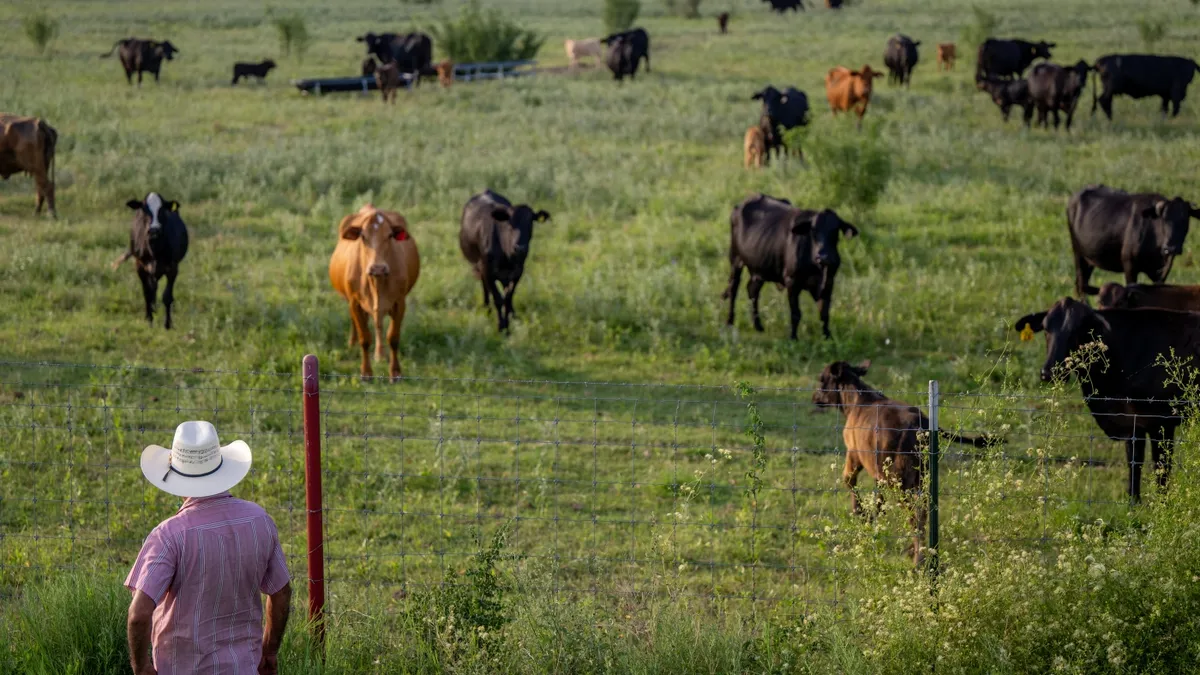
This year, Destinee Weeks and her husband, who manage a herd of approximately 250 cattle in northern Oklahoma, began to see a profit for the first time in a decade. However, Weeks was left shocked and dismayed when she learned that President Trump was considering importing more beef from Argentina. "It feels like a slap in the face to rural America," she expressed. "It makes you feel invisible and overlooked." This sentiment reflects the challenges faced by American cattle ranchers as beef prices in the U.S. have surged, primarily due to a diminished cattle supply.
Recently, President Trump suggested that buying beef from Argentina could be one potential solution to lower costs. This proposal comes on the heels of his agreement to a $20 billion currency swap aimed at assisting Argentina's struggling economy. In response, American cattle ranchers and various agricultural groups swiftly voiced their opposition, arguing that such a deal could severely undermine domestic ranchers. However, Trump defended his stance, stating, "Argentina is fighting for its life." He further claimed on Truth Social that his global tariffs have been beneficial for ranchers, asserting that the only reason they are experiencing profitability for the first time in decades is due to his tariffs on imported cattle.
The tensions escalated as the White House confirmed plans to quadruple the tariff-rate quota for beef imports from Argentina. On the same day, the Department of Agriculture announced an action plan designed to support domestic cattle ranchers. The United States Cattlemen's Association acknowledged the USDA's initiative as a positive step forward but expressed deep concerns regarding the proposed foreign beef purchases. USCA president Justin Tupper stated, "A deal of this magnitude with Argentina would undercut the very foundation of our cattle industry."
American cattle ranchers emphasize that the current high prices are not a result of their actions. The U.S. cattle inventory is at its lowest levels in decades, a trend exacerbated by drought and soaring operational costs, forcing many ranchers to reduce their herds. In August, the price of ground beef reached approximately $6.63 per pound, about two dollars more than four years ago, according to the Bureau of Labor Statistics. While higher prices have allowed some ranchers, like Weeks, to recover, she clarified, "When we say it's profitable, no one's riding off into the sunset in a yacht. We're healing up."
Some ranchers argue that a significant factor influencing beef prices is the consolidation within the meatpacking industry, where four firms control over 80% of U.S. beef processing. Christian Lovell, an Illinois cattle producer and senior director at Farm Action, a nonpartisan advocacy group, stated, "The American rancher is not in control of the price of beef in this country." Recently, two of these companies, Tyson Foods and Cargill, agreed to pay a combined $87.5 million to settle a class-action lawsuit alleging price-fixing, which Lovell cites as a reason for calling the cattle market broken. He stressed that importing more beef would not resolve the underlying issues.
Experts are skeptical that importing Argentine beef will effectively lower prices. The U.S. already imports a record volume of beef from various countries, including Argentina. According to David Anderson, a livestock economist at Texas A&M University, the challenge lies in the fact that the U.S. is the world's largest beef consumer. He stated, "It's unlikely that Argentina has nearly enough supply to satisfy America's appetite." Anderson also noted that stabilizing beef prices will require time and that there is no simple solution.
The situation has become increasingly precarious for farmers like John Boyd Jr., a cattle and crop farmer in Virginia and founder of the National Black Farmers Association. Boyd has been impacted by Trump's trade war with China, which has halted U.S. soybean purchases. Now, he is worried about the implications for his cattle business. "Everything that the president is messing with and interfering with affects my farming operation," he remarked. In response to ranchers' concerns, the USDA has outlined plans to fortify the country’s beef industry, including enhancing grazing access and improving natural disaster relief.
Despite federal assurances, Boyd remains opposed to the idea of importing more meat from Argentina. "I'm opposed to Argentina getting anything else from the United States," he asserted. These tensions are particularly significant as farmers and ranchers are a vital voting bloc for Trump. Weeks from Oklahoma concluded, "I think that we should always choose to support our domestic producers." As the beef industry navigates these challenges, the balance between foreign imports and domestic support continues to be a hotly debated topic.